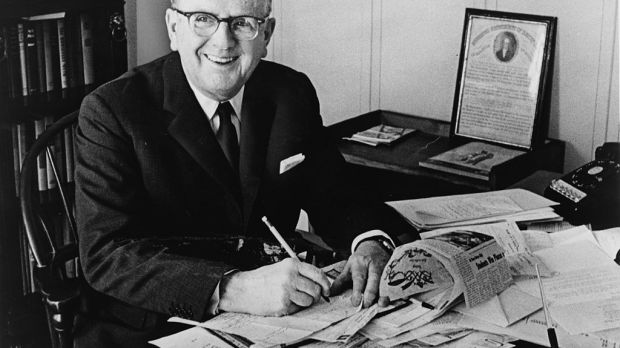If you want to understand Donald Trump’s faith, it helps to understand one of the most influential ministers of the last century, the Rev. Norman Vincent Peale.The New York Times notes:
For all that has been written about Mr. Trump’s high-profile careers — as a real estate developer, a casino owner and a reality-television personality — relatively little attention has been focused on the role religion played in shaping his personality. Overlooked amid tabloid accounts of his romances or financial-page articles about his ups and downs are the periods in his life when he was going to church, first as a regular at a Presbyterian church in Queens, where he grew up, and later, as a less frequent worshiper at Marble, one of America’s oldest and most famous churches.
Mr. Trump, now the Republican nominee for president, had an intriguing relationship with Marble. He attended its Sunday services for almost 50 years, but says he does not know if he ever formally joined the church. He describes himself as a Presbyterian, but Marble is not a Presbyterian church — it is part of the Reformed Church in America, a separate denomination that traces its beginnings to 1628 and the first ordained minister in New Amsterdam, as New York was then known.
Mr. Trump married his first wife, Ivana, at Marble, in a ceremony performed by one of America’s most famous ministers, the Rev. Norman Vincent Peale. His marriage to Ms. Maples was performed by Dr. Peale’s successor, the Rev. Arthur Caliandro, who, like Mr. Trump, was married three times.
…Some theologians criticized Dr. Peale’s brand of Christianity as superficial. The current senior minister, Dr. Michael B. Brown, suggested that there were really two Norman Vincent Peales — “Peale the motivator and Peale the pastor” — and that Dr. Peale’s ministry at Marble is often misunderstood because “a lot of the public thinks Peale the pastor was saying the same stuff as Peale the motivator.”
“In the motivational speaking world,” Dr. Brown added, “he would say, ‘You can if you think you can.’ In the pulpit, he would quote Philippians 4 and say, ‘I can do all things through Christ who strengthens me.’”
Last month, Matthew Schmitz in First Things had more on Peale’s theology:
When Trump met him, Peale was already famous as the author of The Power of Positive Thinking, a book that would go on to sell some five million copies. Peale occupied a position at the center of the establishment, though this standing was endangered in 1960, when he joined a group of 150 Protestant pastors, including Billy Graham, that wanted to keep Kennedy out of the White House. The group issued a manifesto asking whether a Catholic could be trusted as president when Rome had shown such “determined efforts . . . to breach the wall of separation of church and state.” Peale led the public presentation of the document and faced an immediate backlash from Union Theological Seminary’s Reinhold Niebuhr and John Bennett, who accused him of “blind prejudice.” The embarrassed Peale apologized and from then on sought to distance his teaching from the harsh realities of politics. Before Trump made his own foray into politics, he read Peale’s book and adopted its program of “positive thinking.” The two men began to trade public compliments. Peale, always generous in his assessments of human nature, said that Trump had a “profound streak of honest humility.” Trump, not exactly showing that humble streak, said that Peale “thought I was his greatest student of all time.” In a certain sense, Trump was right. Peale has had no more perfect disciple. Peale distilled the optimism and self-sufficiency of the American character into a simple creed. The first article of his faith was a warm patriotism. He called the U.S. “the greatest country in the world” and addressed his writing to “everyday people of this land” who “are my own kind whom I know and love and believe in with great faith.” These were the people he met in masonic halls, resort hotels, and cruise-ship conference rooms. In them he sensed innate decency and ability. Any one of them could become efficient and successful—if only he would believe in himself, harnessing the power of positive thinking.
Over the weekend, my pastor reminded me of a clever quote attributed Adlai Stevenson (and mentioned in the Times piece): “I find the Apostle Paul appealing,” he said, “and the Apostle Peale appalling.” Whatever one may think of him, Peale endures. His influence on Trump—and this year’s election—is no small thing.
UPDATE: On Facebook, someone asked if Hillary Clinton had a similar spiritual mentor. RNS reported earlier this year:
As a girl, she was part of the guild that cleaned the altar at First United Methodist Church in Park Ridge, Ill. As a teen, she visited inner-city Chicago churches with the youth pastor, Don Jones, her spiritual mentor until his death in 2009. During her husband’s presidency, the first family worshipped at Washington’s Foundry United Methodist Church, and this fall she spoke at the church’s 200th anniversary. Time magazine described her membership in a bipartisan women’s prayer group organized by evangelicals.
Photo: Wikipedia

